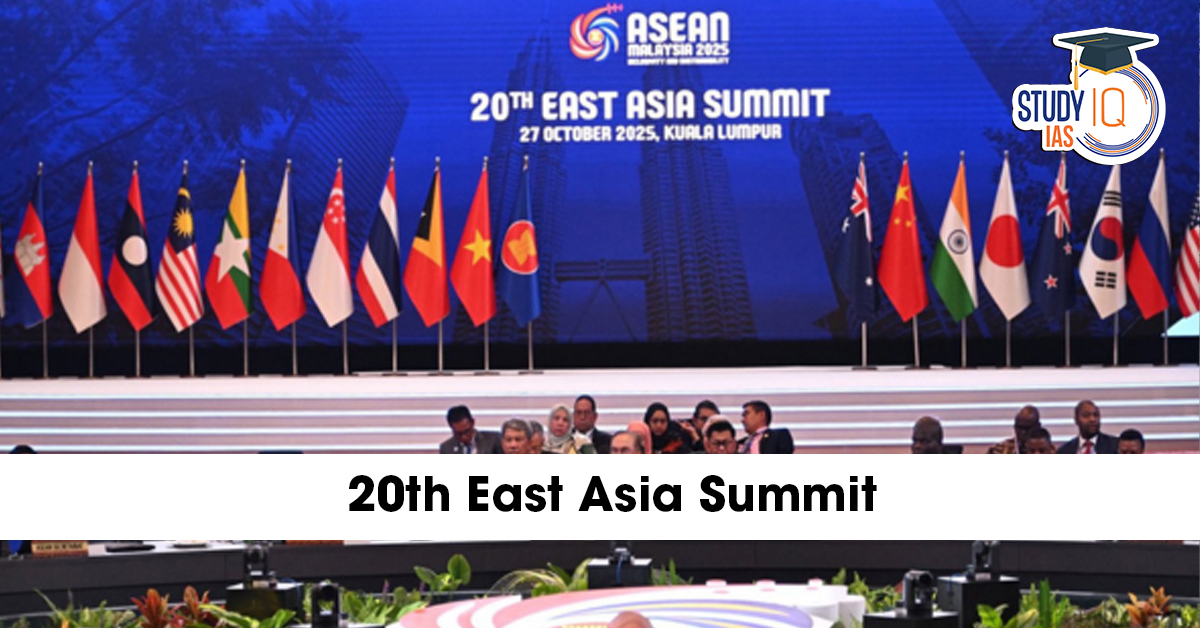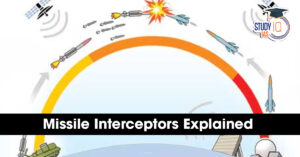Table of Contents
The 20th East Asia Summit (EAS) was held in Kuala Lumpur, Malaysia, on October 28, 2025, marking the 20th anniversary of the forum’s inception. Leaders from 18 member countries reaffirmed their commitment to multilateralism, international law, and the UN Charter, emphasizing the East Asia Summit’s pivotal role in maintaining regional peace, stability, and economic growth.
The event concluded with the Kuala Lumpur Declaration, which laid out a collective vision for addressing contemporary global challenges, from geopolitical tensions to transboundary issues like climate change and economic uncertainty.
About the East Asia Summit (EAS)
The East Asia Summit (EAS) is a leaders-led forum established in 2005, bringing together nations from Southeast Asia and key global partners to discuss strategic, political, and economic issues. It serves as a vital component of the ASEAN-centered regional architecture.
Members:
10 ASEAN nations (Brunei, Cambodia, Indonesia, Laos, Malaysia, Myanmar, the Philippines, Singapore, Thailand, and Vietnam)
-
8 Dialogue Partners (Australia, China, India, Japan, New Zealand, South Korea, Russia, and the United States)
Chair for 2025: Malaysia
Theme: “Collective Action for Peace and Prosperity in the Indo-Pacific”
Key Highlights of the Kuala Lumpur Declaration
1. Reaffirmation of Multilateralism and International Law
Member nations collectively emphasized that multilateralism based on the UN Charter and international law remains the foundation of global peace and prosperity.
The declaration urged dialogue, mutual respect, and peaceful settlement of disputes, particularly amid growing geopolitical tensions in the Indo-Pacific and South China Sea.
2. Strengthening the East Asia Summit Mechanism
The leaders agreed to retain the informal and interactive nature of the EAS to encourage candid dialogue among member states.
They endorsed continued cooperation under the East Asia Summit Plan of Action (2024–2028), aligning with the ASEAN Vision 2045 for a cohesive, peaceful, and resilient Asia-Pacific region.
3. Support for ASEAN Outlook on the Indo-Pacific (AOIP)
The Summit reaffirmed strong backing for the ASEAN Outlook on the Indo-Pacific (AOIP) — a strategic framework promoting:
-
Inclusivity and transparency in regional cooperation
-
Freedom of navigation and overflight
-
Economic and maritime collaboration
-
Sustainable development and connectivity
The AOIP is seen as an essential complement to the broader ASEAN Community-Building Process, reinforcing ASEAN’s central role in regional diplomacy.
4. Collective Response to Emerging Global Challenges
Leaders recognized the urgency of geopolitical conflicts, economic instability, climate change, and transboundary security threats.
The declaration urged collective collaboration to ensure global peace, resilience, and inclusive growth, stressing that no nation can tackle such issues alone.
5. Commitment to Peaceful Dialogue and Trust-Building
In a direct reference to ongoing disputes in the Indo-Pacific, the statement underscored the need for:
“Enhancing mutual understanding, respect, trust, and friendship, as well as settlement of differences and disputes by peaceful means in accordance with international law.”
This reaffirmation is crucial amid rising China–US rivalry, territorial disputes in the South China Sea, and North Korea’s nuclear provocations.
India’s Role in the East Asia Summit 2025
India, a founding member of the EAS since 2005, reiterated its commitment to ASEAN centrality and free, open, and rules-based Indo-Pacific cooperation.
New Delhi supported the Kuala Lumpur Declaration’s emphasis on multilateralism, highlighting that collective diplomacy is essential to safeguard global commons like maritime trade, cybersecurity, and sustainable development.
The Indian delegation also emphasized the importance of digital connectivity, renewable energy, and resilient supply chains, aligning with its Act East Policy and Indo-Pacific Oceans Initiative (IPOI).
Significance of the 20th EAS
The 20th East Asia Summit marks a turning point for ASEAN and the wider Indo-Pacific in a period of shifting power balances. Its reaffirmation of international law, multilateralism, and regional cooperation sends a strong signal of unity and shared responsibility among member nations.
The Kuala Lumpur Declaration not only reinforces ASEAN’s leadership in shaping the Indo-Pacific’s future but also underscores the collective vision of a peaceful, inclusive, and prosperous Asia-Pacific region.
Key Takeaways at a Glance
| Parameter | Details |
|---|---|
| Event | 20th East Asia Summit (EAS) 2025 |
| Date | October 28, 2025 |
| Venue | Kuala Lumpur, Malaysia |
| Chair | Malaysia |
| Theme | “Collective Action for Peace and Prosperity in the Indo-Pacific” |
| Key Declaration | Reaffirmation of multilateralism and ASEAN centrality |
| Major Focus Areas | AOIP implementation, peace, stability, economic cooperation |
| India’s Role | Supported ASEAN-led initiatives, promoted rules-based Indo-Pacific |
| Outcome Document | Kuala Lumpur Declaration 2025 |
Conclusion
The 20th East Asia Summit (EAS) 2025 reaffirmed that multilateral cooperation and ASEAN centrality remain the cornerstones of a peaceful and prosperous Indo-Pacific. As geopolitical tensions and transnational challenges rise, the EAS serves as a vital platform for dialogue and collective action — fostering trust, inclusivity, and a shared commitment to global peace and progress.


 Navigating Uncharted Waters: What Next f...
Navigating Uncharted Waters: What Next f...
 Astronaut Reentry Explained: How Spacecr...
Astronaut Reentry Explained: How Spacecr...
 Missile Interceptors Explained: Role in ...
Missile Interceptors Explained: Role in ...




















